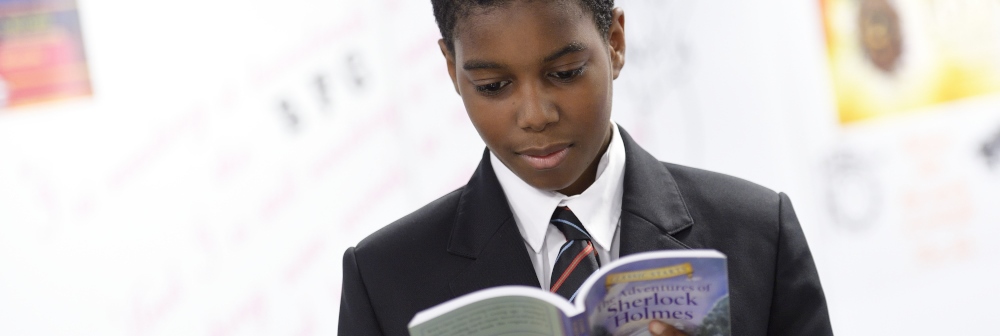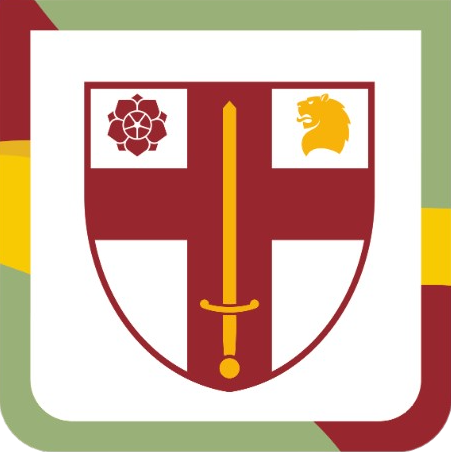English

“Blessed is he who reads and those who hear the words of the prophecy”
Revelation 1:3
Overview
“A high-quality education in English will teach pupils to speak and write fluently so that they can communicate their ideas and emotions to others and through their reading and listening, others can communicate with them. Through reading in particular, pupils have a chance to develop culturally, emotionally, intellectually, socially and spiritually. Literature, especially, plays a key role in such development. Reading also enables pupils both to acquire knowledge and to build on what they already know. All the skills of language are essential to participating fully as a member of society.” (DfE, 2013)
Aims of English
Following the National Curriculum, at Cardinal Heenan, we intend that all pupils:
- Read easily, fluently and with good understanding
- Develop the habit of reading widely and often, for both pleasure and information
- Acquire a wide vocabulary, an understanding of grammar and knowledge of linguistic conventions for reading, writing and spoken language
- Appreciate our rich and varied literary heritage
- Write clearly, accurately and coherently, adapting their language and style in and for a range of contexts, purposes and audiences
- Use discussion in order to learn; they should be able to elaborate and explain clearly their understanding and ideas
- Are competent in the arts of speaking and listening, making formal presentations, demonstrating to others and participating in debate.
What is the curriculum intent for your subject area?
That our students will:
- Appreciate the significance of English as a key life skill.
- Understand that behind every text ever written there is writer intent.
- Understand and acquire a control over language, both written and spoken, so that they can discover the potential power it can have and can give.
- Develop empathy and cultural / social capital through the texts and issues studied as part of English Language and Literature.
- Be prepared for, and equipped with the skills needed for their next steps, whether as part of the cohort continuing to KS5, or into employment / training
Key Stage 3 Curriculum
In KS3, students will study a maximum of 3 topics per year. This allows for concepts and ideas to be covered in depth and detail. Topics will include formative and summative assessment of reading writing and spoken language.
The topics listed below will be enhanced with a weekly ‘Reciprocal Read’ session, covering a wide-range of texts through teaching of the skills needed to read fluently and confidently.
As part of English lessons, students have access to a range of novels, ranging from ‘Trash’ to ‘Lord of the Flies’, ‘The Giver’ to ‘Noughts and Crosses’.
All KS3 students will also have a login for SparxReader, giving access to a wide variety of texts on any device.
Year 7:
Term 1 – Heroes and Villains What makes a hero? Super Heroes, or just everyday superstars – who deserves our adulation? You decide. Includes study of Greek Myths, sporting heroes, and Shakespearean heroes and villains, and our own personal choices.
Term 2 – Autobiography
From reading a range of autobiographical extracts, to planning and crafting our own, we’ll be exploring Autobiography as an inspiration for writers and poets, as well as the conventions of the form, including writing by Roald Dahl, Nelson Mandela, and Steven Gerrard amongst others.
Term 3 – Author Study - Shocking Shakespeare
From learning about the words and phrases that Shakespeare gave us, to investigating the rich language used in ‘Romeo and Juliet’, this unit is all about the Bard, including a speech about whether or not he’s still worth studying!
Year 8:
Term 1 – Dystopia
Looking at the Dystopian genre of Literature, with a focus on classic short stories, and the writer’s craft. Developing skills of inference and deduction.
Term 2 - Points of View
Focusing on a wide range of thematic issues, from saving the planet to school uniform preferences! Students will examine how to effectively present their point of view, whilst developing their personal viewpoint on a range of topics.
Term 3 – Class & Society
Based around a study of Priestley’s ‘An Inspector Calls’, students will be invited to consider the theme of social responsibility, and what makes us ‘good’ citizens.
Year 9:
Term 1 – The Writers’ Craft
Attempting to answer the question – what makes writing memorable and enjoyable? Looking at a range of writers, from Poe to Dahl – considering contexts, techniques and genres. Texts Including:
- Lamb to the Slaughter
- The Tell-Tale Heart
- A Vendetta
- Poetry by Maya Angelou
Term 2 - Gothic & Horror
Exploring the Gothic genre through drama, and poetry – what accounts for the fascination with things that scare us? We will look at concepts including; the macabre and the supernatural, justice and retribution. Texts include:
- Hamlet
- The Tell-Tale Heart
- The Monkey’s Paw
Term 3 – In Our Liverpool Home
Liverpool. Is it more than just the Beatles and a Ferry Across the Mersey? Looking at some of our famous writers, their texts and the events that shaped our city. Focus on Willy Russell. Texts Including:
- Our Day Out
- Bill Bryson writing on Liverpool
- Poetry by Roger McGough
KS4 Curriculum
Building upon the skills covered in KS3, and drawing on the conventions of literature studied in year 9, all students follow the AQA Specifications for English Language and English Literature, with 2 qualifications taught symbiotically over 2 years. Students will be awarded 2 separate GCSE grades.
Topics will include formal and summative assessment of reading, writing and spoken language.
Skills will be revisited and refined across Years 10 and 11, to ensure that best practice in interleaving strategies to aid retrieval and memory are in place.
English Language Paper 1 & 2 – Skills & Knowledge
Including a range of past papers to practice the taught skills, including:
- The Mill
- City of Beasts
- The Tiredness of Rosabel
- The Pearl
- Morning Glass
- Shooting an Elephant
English Literature Paper 1 & 2 - Skills & Knowledge
Students will be taught to analyse a range of literary texts, including:
- Macbeth – pupils will explore Shakespeare’s use of Aristotle’s conventions of Greek tragedy in this play, along with developing an understanding of Jacobean times.
- A Christmas Carol – pupils will explore Dickens’ portrayal of society’s capitalist and misanthropic ideology and its impact on the less fortunate in society.
- Blood Brothers – pupils will explore society’s laissez-faire attitude towards the life chances of the working class in Liverpool during Thatcherism.
- Power and Conflict Poetry
- Unseen Poetry
Extracurricular Activities
Students in English regularly enter national creative writing competitions, focused on both poetry and prose. DebateMate debating society has a strong presence in school, rooted firmly in English.
KS5 students have watched live performances of National Theatre productions, along with visits to local theatres.
Useful Links
SparxReader https://sparxreader.com/login
DebateMate https://debatemate.com/
BBC Bitesize https://www.bbc.co.uk/bitesize/subjects/z3kw2hv
GCSE Bitesize https://www.bbc.co.uk/bitesize/subjects/zr9d7ty https://www.bbc.co.uk/bitesize/subjects/zckw2hv
Seneca https://senecalearning.com/en-GB/
Sussex University https://www.sussex.ac.uk/informatics/pu


